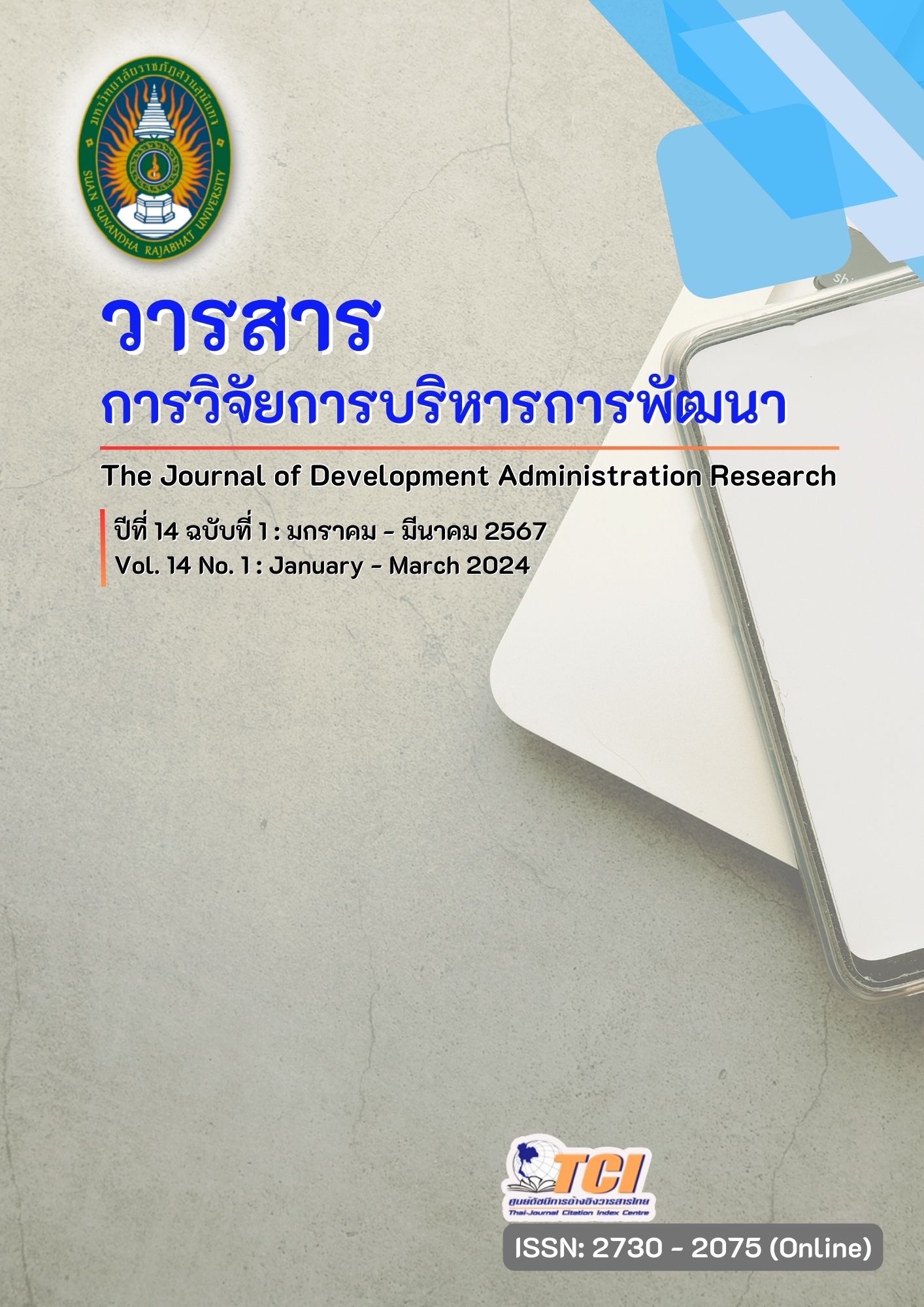ปัจจัยเชิงสาเหตุของการนำเทคโนโลยีการขายมาใช้ที่ส่งผลต่อความตั้งใจเชิงพฤติกรรมของธุรกิจออนไลน์ในวิสาหกิจขนาดกลางและขนาดย่อม
คำสำคัญ:
การรับรู้คุณค่าการใช้งาน, การเข้าถึงผู้ใช้งาน, อิทธิพลทางสังคม, เทคโนโลยีการขาย, ความตั้งใจเชิงพฤติกรรมบทคัดย่อ
การซื้อสินค้าทางเว็บไซต์เป็นหนึ่งในกิจกรรมที่นิยมมากที่สุดของอินเทอร์เน็ต แต่เหตุผลที่ผู้บริโภคซื้อสินค้าทางเว็บไซต์ยังไม่ชัดเจน วัตถุประสงค์ของการวิจัยนี้ คือ 1) เพื่อศึกษาระดับปัจจัยเชิงสาเหตุที่ส่งผลต่อความตั้งใจเชิงพฤติกรรมและการใช้เทคโนโลยีเพื่อการขายสินค้าของวิสาหกิจขนาดกลางและขนาดย่อม 2) เพื่อศึกษาอิทธิพลของปัจจัยเชิงสาเหตุของการนำเทคโนโลยีการขายมาใช้ที่ส่งผลต่อความตั้งใจเชิงพฤติกรรมของธุรกิจออนไลน์ในวิสาหกิจขนาดกลางและขนาดย่อม, และ 3) เพื่อสร้างแบบจำลองของปัจจัยเชิงสาเหตุของการนำเทคโนโลยีการขายมาใช้ที่ส่งผลต่อความตั้งใจเชิงพฤติกรรมของธุรกิจออนไลน์ในวิสาหกิจขนาดกลางและขนาดย่อม ใช้วิธีการวิจัยเชิงปริมาณ โดยเก็บข้อมูลด้วยแบบสอบถามออนไลน์ จากผู้ประกอบการธุรกิจออนไลน์ โดยใช้วิธีการคำนวณกลุ่มตัวอย่างแบบ Krejcie & Morgan (1970) ได้กลุ่มตัวอย่างจำนวน 384 ราย และใช้วิธีวิเคราะห์ทางสถิติด้วยสมการโครงสร้าง (Structural Equation Model: SEM)
ผลการวิเคราะห์สรุปได้ว่า ปัจจัยเชิงสาเหตุได้แก่ ระดับการรับรู้คุณค่าในการใช้งานส่งผลต่อการนำเทคโนโลยีการขายมาใช้, การรับรู้คุณค่าในการใช้งานส่งผลต่อความตั้งใจเชิงพฤติกรรมผ่านการนำเทคโนโลยีการขายมาใช้, การเข้าถึงของผู้ใช้งานส่งผลต่อการนำเทคโนโลยีการขายมาใช้, การเข้าถึงของผู้ใช้งานส่งผลต่อความตั้งใจเชิงพฤติกรรมผ่านการนำเทคโนโลยีการขายมาใช้อยู่ในระดับมากที่สุด ส่วนอิทธิพลทางสังคมส่งผลต่อการนำเทคโนโลยีการขายมาใช้, อิทธิพลทางสังคมส่งผลต่อความตั้งใจเชิงพฤติกรรมผ่านการนำเทคโนโลยีการขายมาใช้, และการนำเทคโนโลยีการขายมาใช้ส่งผลต่อความตั้งใจเชิงพฤติกรรม โดยธุรกิจออนไลน์ สามารถระบุการนำเทคโนโลยีการขายมาใช้ได้ รวมถึงสามารถนำไปใช้ในการเพิ่มความตั้งใจเชิงพฤติกรรมของลูกค้ามาซื้อสินค้าออนไลน์ และทำให้ธุรกิจออนไลน์สามารถแข่งขันกับผู้ประกอบการอื่น ๆ
เอกสารอ้างอิง
ณัฐา ฉางชูโต. (2555). ระดับความสำคัญของปัจจัยการสื่อสารการตลาดในการซื้อสินค้าและบริการออนไลน์ของผู้บริโภค. กรุงเทพฯ: มหาวิทยาลัยกรุงเทพ.
ศูนย์วิจัยกสิกรไทย. (2566). เศรษฐกิจไทยปี 2566. ค้นเมื่อ 8 กรกฎาคม 2556, จากwww.kasikornbank.com/th/news/pages/thai-economic-2023.aspx
Akram, M.W. (2023). Influence of social media on consumer’s online purchasing habits during the COVID-19 pandemic in Pakistan. International Journal of Management Research and Emerging Sciences, 13(1),197-215.
Davis, F.D. and Davi, F. (1989). Perceived usefulness, perceived ease of use, and user acceptance of information technology, MIS Quarterly, 13(3), 319-339.
Fatah, Y., Rofiq, A., & Indrawati, N.K. (2023). The effect of trust and perceived value on reuse intention of Linkaja application users mediated by customer satisfaction. Journal of World Science, 2 (3), 445-458.
Hair, J., Black, W., Babin, B., Anderson, R. and Tatham, R. (2006) Multivariate data analysis. (6th ed.). Upper Saddle River, NJ: Pearson Prentice Hall.
Harun, N.B., Jalil, H.A., & Zolkepli, M. (2022). Technological, organizational and environmental factors influencing on user intention towards big data technology adoption in Malaysian educational organization. Accounting, 8(4), 403-408.
Hasan, A.A. (2022). Perceived value and behavioral intentions toward dining at Chinese restaurants in Bangladesh: the role of self-direction value and price fairness. South Asian Journal of Marketing, 3(2), 116-134.
omburg, C., Wieseke, J., & Kuehnl, C. (2009). Social influence on salespeople's adoption of sales technology: A multilevel analysis. Journal of the Academy of Marketing Science, 38(2), 159-168.
Israfilzade, K. & Baghirova, S. (2023). Comparing the impact of brand and user-generated video content on online shoppers’ purchasing intentions. Management of Organizations: Systematic Research, 88(1), 69-84.
Liu, Y. (2023). Effects of user experience in live marketing on consumer purchase intention. Retrieved from https://bcpublication.org/index.php/BM/article/view/4159
Liu, Y., Gan, Y., Song, Y., & Liu, J. (2021). What influences the perceived trust of a voice-enabled smart home system: An empirical study. Sensors, 21(6), 2037.
Mohamed, M. & Rahman, N.A.F.W. (2022). The relationship between service quality, perceived value, satisfaction and behavioral intentions in rail transport industry. Journal of Tourism Hospitality and Environment Management, 7(30), 30-38.
Nainggolan, I. & Handayani, P.W. (2023). Factors affecting individual’s behavioral intention to use online capital market investment platforms in Indonesia. Interdisciplinary Journal of Information, 18, 1-29.
Naqbi, A. & Yassin, A.M. (2022). Attributes of mobile technology adoption acceptance from users perspective. International Journal of Sustainable Construction Engineering and Technology, 13(2), 220-232.
Nwachukwu, D., Azuonwu, Nwador, C., & Origbo, H. (2023). Self-service technology adoption and post-purchase intentions of deposit money banks customers in Port Harcourt. International Journal of Management Sciences,10(1), 175 – 211.
Nyagadza, B. & Mazuruse, G. (2023). Examining the influence of social media eWOM on consumers’ purchase intentions of commercialised indigenous fruits (IFs) products in FMCGs retailers. Sustainable Technology and Entrepreneurship, 2(3), 100040.
Poggi, N., Carrera, D., & Gavalda, R. (2014). A methodology for the evaluation of high response time on E-commerce users and sales. Information Systems Frontiers, 16(5), 867-885.
Salehi, S., Miremadi, I., Negati, M.G., & Ghafouri, H. (2023). Fostering the adoption and use of super App technology. IEEE Transactions on Engineering Management, 99, 1-15.
Schendzielarz, D., Alavi, S., & Guba, J.H. (2022). The impact of salespeople’s social media adoption on customer acquisition performance – a contextual perspective. Journal of Personal Selling and Sales Management, 42(7), 1-19.
Sudaryantom, M.R., Hendrawan, M.A., & Andrian, T. (2023). The effect of technology readiness, digital competence, perceived usefulness, and ease of use on accounting students artificial intelligence technology adoption. In Proceedings of the E3S Web of Conferences, 388, 9.
Yang, X. (2023). Consumers' purchase intentions in social commerce: the role of social psychological distance, perceived value, and perceived cognitive effort. Information Technology and People, 35(8), 330-348.
Yeik, K.K., Marc, L.W., Kaur, S., & Soh, K. (2023). How and when social media influencers’ intimate self-disclosure fosters purchase intentions: the roles of congruency and parasocial relationships. Marketing Intelligence & Planning. Marketing Intelligence & Planning, 41, 2-3.
Zhang, s. & Zhang, L. (2023). The influence of brand social interaction on purchase intention: A perspective of social capital. SAGE Open, 13(2), 21582440231.
Zhao, P., Ma, Z., Gill, T., & Ranaweera, C. (2023). Social media sentiment polarization and its impact on product adoption. Marketing Letters, 34, 497–512.
ดาวน์โหลด
เผยแพร่แล้ว
รูปแบบการอ้างอิง
ฉบับ
ประเภทบทความ
สัญญาอนุญาต
ลิขสิทธิ์ (c) 2024 วารสารการวิจัยการบริหารการพัฒนา

อนุญาตภายใต้เงื่อนไข Creative Commons Attribution-NonCommercial-NoDerivatives 4.0 International License.
บทความที่ได้รับการตีพิมพ์เป็นลิขสิทธิ์ของมหาวิทยาลัยราชภัฏสวนสุนันทา
ข้อความที่ปรากฏในบทความแต่ละเรื่องในวารสารวิชาการเล่มนี้เป็นความคิดเห็นส่วนตัวของผู้เขียนแต่ละท่านไม่เกี่ยวข้องกับมหาวิทยาลัยราชภัฏสวนสุนันทา และคณาจารย์ท่านอื่นๆ ในมหาวิทยาลัยฯ แต่อย่างใด ความรับผิดชอบองค์ประกอบทั้งหมดของบทความแต่ละเรื่องเป็นของผู้เขียนแต่ละท่าน หากมีความผิดพลาดใดๆ ผู้เขียนแต่ละท่านจะรับผิดชอบบทความของตนเองแต่ผู้เดียว




